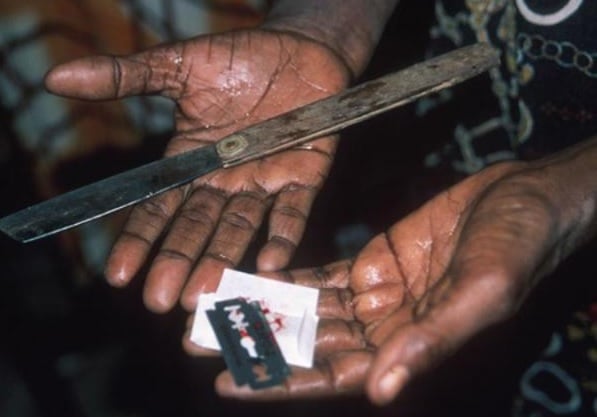Until July 2015, my knowledge of the adverse effects of “female circumcision” was woefully limited. I knew that circumcised women could not live normal sexual lives. My idea of circumcision was just “removal of the clitoris”. My understanding of its occurrence: just some parts of eastern Nigeria.
Everything changed when I attended a United Nations Population Fund (UNFPA) training on ‘female genital mutilation. Yes, ‘genital mutilation’ – not ‘female circumcision’; that was the first lesson. As I came to understand, this practice transcends the mere “removal” of the female organs; it, indeed, is the “destruction” of the organs.
HOW THE DAMAGE IS DONE
A little description of the types of mutilation may help. In Clitoridectomy, the clitoris – a small, sensitive and erectile part of the female genitals – is partially or wholly removed. In very rare cases, only the prepuce (the fold of skin surrounding the clitoris) is cut off.
In Excision, the clitoris and the labia minora, with or without excision of the labia majora (labia are the ‘lips’ surrounding the vagina) are partially or wholly removed.
Advertisement
A third type called Infibulation involves the narrowing of the vaginal opening through the creation of a covering seal formed by cutting and re-positioning the inner, or outer, labia, with or without removal of the clitoris.
In a fourth category are all other procedures that are harmful to the female genitalia for non-medical purposes, e.g. pricking, piercing, incising, scraping and cauterising the genital area.
Offensive as these explanations undoubtedly seem, it is impossible to completely appreciate the physical damage of the practice until dummies of the natural and mutilated female organs are compared. Only that sight can tell the full story.
Advertisement
I found out, too, that FGM is widely practised in Nigeria, contrary to my previous impression of its concentration in the east. In fact, of the six largest ethnic groups in the country – the Yoruba, Hausa, Fulani, Igbo, Ijaw, and Kanuri – only the Fulani do not practise any form. In all, a staggering 19.9 million Nigerian girls and women are thought to have been mutilated.
A subsequent visit at the end of September to Osun and Imo – two states with high prevalence rates – led me to some more interesting discoveries. In the first state, my interaction with six circumcised women showed that all of them had tears during their first time in labour. The one who was a mother of two suffered a tear on each delivery. Another, a mother of five, suffered tears during each labour-room adventure.
WHY CUT GIRLS?
By the accounts of community development workers and medical practitioners, circumcised women are susceptible to a long list of health troubles ranging from severe pain and bleeding, to shock, difficulty in passing urine, infections, injury to nearby genital tissue, haemorrhagic shock, neurogenic shock and sometimes, death.
According to Manfred Nowak, UN special rapporteur on torture, “the pain inflicted by FGM does not stop with the initial procedure, but often continues as ongoing torture throughout a woman’s life”.
Advertisement
So, why did the practice start in the first place, and why is it still on?
It is almost impossible to imagine that someone, in this age, believes that the clitoris of an uncircumcised woman will grow as long as the penis – or that if the head of a newborn touched the clitoris of an uncircumcised woman, the child would die. These are myths that do not need to be disproved to literates.
But even among the elites, there is still the belief that uncircumcised women are likely to be promiscuous, and circumcised ones faithful. Unfortunately, the validity of this argument has no place outside the narrow reasoning of stereotyping.
The first circumcised lady I ever came across was someone who had slept with a lecturer, and she was wondering if she was abnormal to be feeling guiltless about it. “I slept with my lecturer not because I liked him but because I wanted his marks, and it doesn’t feel like I have done any wrong,” she confided in me. “But blame my parents, not me. When you are circumcised and you don’t enjoy sex, you can actually afford to give it to someone with your eyes closed, because the intimacy of lovemaking cannot be felt.”
Advertisement
LET’S SAVE THE ENDANGERED GIRL
There were wild jubilations in advocacy circles when Goodluck Jonathan signed the Violence Against Persons Prohibition (VAPP) Bill into law, in one of his final official functions as president. But being a country where law enforcement is by far a bigger challenge than promulgation, too much, really, can’t be read into positives of the law for the prospects of eradicating the practice.
In any case, most of the circumcisers – they are concentrated in some of the most interiorly-located villages of their states – have no knowledge of the law. Without enforcement, the celebrations that heralded the passage of the VAPP bill will be short-lived. And at the risk of sounding like a doomsayer, that is the exact situation I foresee.
Advertisement
For now, the intense advocacy work, which a stubborn circumciser in Osun state recently described as ‘mere propaganda’, appears to be the surest way to end the mutilation of females. That ‘propaganda’ will have to be intensified.
The few Osun-based circumcisers I know who have voluntary surrendered their knives all admitted to have had a rethink after understanding the health consequences of the practice. UNFPA and its partners will have to rev up the processes of orientating, training, educating and dialoguing with thought leaders, community heads, health workers, circumcisers and parents. And in a few years, these efforts will be worth the pain because, at the end of the day, no girl deserves to live a life of suffering due to a crude, meaningless act she knew nothing about.
Advertisement
Add a comment







